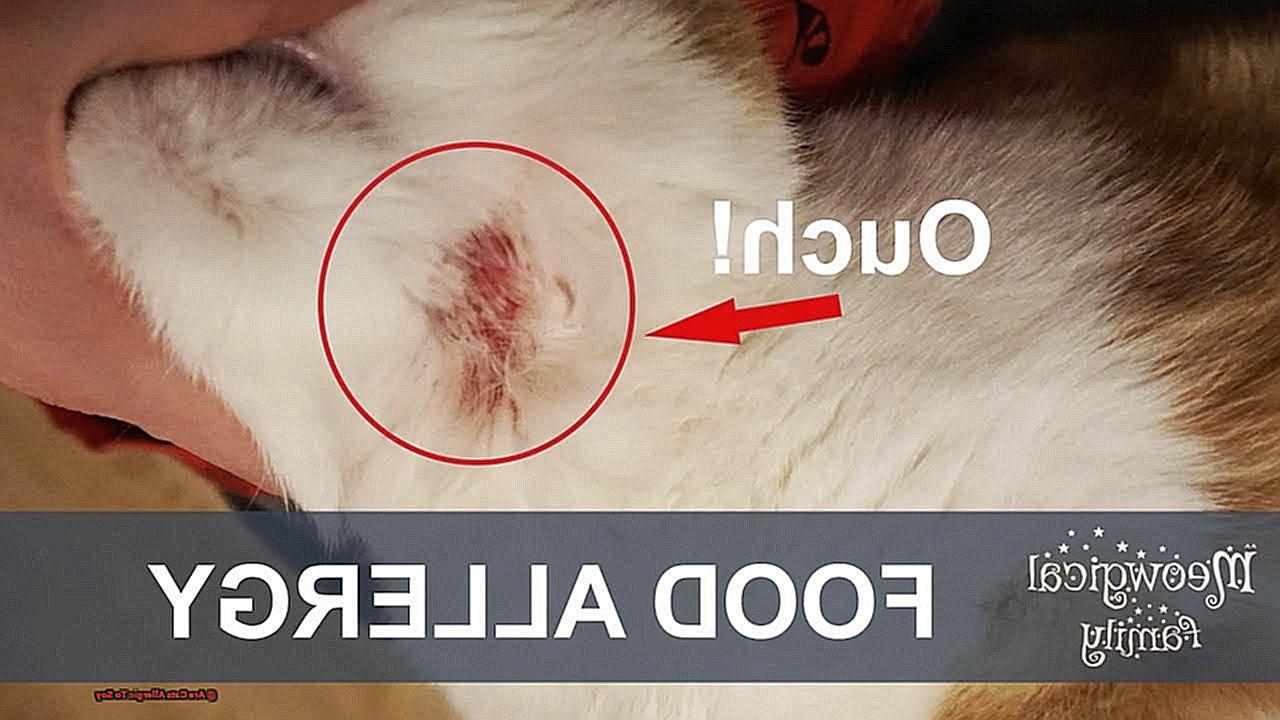We all know that cats are the masters of their own domain, but did you know they can also be susceptible to allergies?
While we often think of pollen and dust as common triggers, there’s one sneaky ingredient that may also cause issues for our beloved kitties: soy. Yes, the same plant-based protein found in many products can actually be an allergen for cats.

As a cat parent, it’s crucial to understand this potential allergy and take steps to manage it. In this blog post, we’ll uncover the signs of soy allergies in cats, how to diagnose them, and what you can do to help your furry companion live a happy and healthy life despite this condition.
So grab your purring partner and let’s explore the world of cats and soy allergies together.
Are Cats Allergic To Soy?
Contents
As a cat owner, it’s natural to want to provide your furry friend with the best nutrition possible. However, with so many different ingredients and dietary trends in the pet food market, it can be challenging to know what is safe and beneficial for your cat. One ingredient that has become increasingly popular in both human and pet food is soy. But are cats allergic to soy? Is it safe for them to consume? Let’s dive into this topic and explore the potential risks and benefits of soy for our feline companions.
Soy and Cats: What You Need to Know
First, let’s clarify what soy is and why it’s included in some pet foods. Soy is a plant-based protein that is derived from soybeans. It is a cost-effective and sustainable source of protein that is commonly used in vegetarian diets for humans. In pet foods, soy may be used as a substitute for animal protein sources or as a filler ingredient.
So, can cats eat soy? The short answer is yes, but it’s not necessarily recommended. Cats are obligate carnivores, meaning they require a diet primarily made up of meat to thrive. Soy is not a necessary part of their diet and does not provide all the essential nutrients they need. However, some commercial cat foods do contain soy as a source of protein, which can lead to allergic reactions in some cats.
Understanding Soy Allergies and Sensitivities in Cats
While cats can potentially be allergic to soy, it is not a common allergen for them. In fact, according to the American Society for the Prevention of Cruelty to Animals (ASPCA), soy is not even listed as one of the top eight allergens for cats. These top allergens include beef, dairy, fish, wheat, chicken, lamb, egg, and corn. However, just like humans, every cat is unique, and some may have individual sensitivities or allergies to soy.
Symptoms of a soy allergy in cats may include skin irritations, gastrointestinal issues, and respiratory problems. It’s crucial for cat owners to pay attention to their cat’s behavior and health after consuming soy-based products. If you notice any of these symptoms, it’s best to consult with your veterinarian for proper diagnosis and treatment.
The top allergens for cats and where soy ranks on the list.
And when it comes to allergies, it can be a tricky game of figuring out what’s causing our cat’s discomfort. While we may be familiar with common allergens like beef, dairy, fish, and wheat, there’s some debate about where soy falls on this list. So let’s dig into the research and explore the question: Is soy a top allergen for cats?
Conflicting Evidence
The answer isn’t as straightforward as we may hope. On one hand, many experts believe that soy is not a common allergen for cats. However, there are also studies and anecdotal evidence that suggest otherwise. In fact, one study found that 6 out of 10 cats with food allergies had a reaction to soy, making it the fifth most common allergen for cats. But here’s where things get interesting – other studies have shown conflicting results, with some finding soy to be a rare cause of allergies in cats.
Factors That May Contribute to Soy’s Ranking
So why is there such conflicting evidence? One reason could be the type of soy used in cat food. Fermented soy products may be less likely to trigger allergies in cats compared to unfermented soy. This is because fermentation breaks down the proteins in soy that can cause allergic reactions. So if your cat has a sensitivity to soy, opting for fermented soy products may help alleviate their symptoms.
Another factor could be that cats may have a lower tolerance for soy compared to other animals. This means that even though soy may not be a common allergen for cats overall, they may still be more prone to developing an allergy to it compared to other animals.
What This Means for Cat Owners
So what does all this information mean for us as cat owners? Well, it’s important to note that just like humans, cats can develop allergies to any food at any time. This means that even if soy is not a common allergen for cats overall, it can still affect some individual cats. If you suspect your cat may be allergic to soy, it’s best to consult with your veterinarian for proper diagnosis and treatment.
Common symptoms of a soy allergy in cats.
As cat owners, we want nothing but the best for our furry companions. We carefully select their food, provide them with a comfortable home, and shower them with love and affection. But what happens when our cat suddenly starts showing signs of discomfort? As it turns out, one possible culprit could be soy.
Soy may not be the first allergen that comes to mind when we think of cats, but according to the American Society for the Prevention of Cruelty to Animals (ASPCA), it is one of the most common food allergies for our feline friends. As an expert on soy allergies in cats, let me guide you through the common symptoms and varying severity of this condition.
The Most Common Symptoms of a Soy Allergy in Cats
Skin irritation, gastrointestinal issues, and respiratory problems are the most common symptoms of a soy allergy in cats. However, these symptoms may vary in severity and can be difficult to pinpoint as they can also be caused by other factors.
Skin Irritation: The First Sign of a Soy Allergy
If your cat is experiencing a soy allergy, skin irritation is likely to be their first symptom. This can manifest as itching, redness, and even hair loss. You may notice your cat excessively scratching or licking at their fur, leading to hot spots or open wounds. In some cases, the skin irritation may also be accompanied by hives or swelling.
Gastrointestinal Issues: Vomiting and Diarrhea
Another common symptom of a soy allergy in cats is gastrointestinal issues. This is because soy can irritate the lining of the stomach and intestines, causing inflammation and discomfort. Your cat may experience vomiting and diarrhea immediately after consuming soy or several hours later.
Respiratory Problems: Sneezing, Coughing, and Difficulty Breathing
Soy allergies can also lead to respiratory problems in cats. This can include sneezing, coughing, and difficulty breathing. Some cats may even develop asthma-like symptoms, where their airways become constricted and they have trouble breathing properly.
Other Possible Symptoms of a Soy Allergy in Cats
While skin irritation, gastrointestinal issues, and respiratory problems are the most common symptoms of a soy allergy in cats, there are other less common signs to look out for. These may include excessive salivation, excessive grooming, and behavioral changes like lethargy or aggression.
The difference between an allergy and a sensitivity to soy.
When they start showing signs of discomfort, it’s natural for us to worry and seek answers. One common culprit that may be causing your cat’s discomfort is soy. But before you start panicking, it’s important to understand the differences between an allergy and sensitivity to soy in cats.
Allergies – The Immune System’s Overreaction
Just like humans, cats can develop allergies to certain substances, including soy. An allergy is an immune response where the body mistakenly identifies a harmless substance as a threat and produces antibodies to fight it off. In the case of soy, these antibodies cause inflammation and other uncomfortable symptoms.
Symptoms of a soy allergy in cats may include itching, redness or swelling of the skin, gastrointestinal upset, respiratory problems, and even anaphylaxis – a life-threatening allergic reaction. If your cat has a known soy allergy, it’s crucial to avoid feeding them any products containing soy and consult with a veterinarian for proper management.
Sensitivities – A Non-Immune Response
On the other hand, sensitivities are non-immune reactions to a substance such as soy. These reactions can still cause discomfort or symptoms in cats but do not involve the immune system. Sensitivities may cause less severe symptoms such as mild digestive issues or skin irritation. While not as severe as allergies, sensitivities can still affect your cat’s quality of life.
It’s important for cat owners to be aware of these differences so they can better understand their cat’s potential reaction to soy. If your cat is experiencing discomfort after consuming foods containing soy, it may be a sensitivity rather than an allergy.
Managing Soy Reactions in Cats
If you suspect your cat has a soy allergy or sensitivity, it’s best to consult with a veterinarian for proper diagnosis and management. They may recommend an elimination diet to determine if soy is the culprit or if there are other allergens at play. If your cat does have a soy allergy, it’s important to avoid feeding them any products containing soy and consider alternative protein sources for their diet.
In the case of sensitivities, removing soy from your cat’s diet may help alleviate symptoms. However, always consult with a veterinarian before making any changes to your cat’s diet to ensure they are receiving proper nutrition.
The importance of quality and source when choosing soy-based products for your cat.
Soy has become a popular ingredient in many cat food and treat options, especially for those following vegetarian or vegan lifestyles. However, as cat owners, it is our responsibility to pay close attention to the quality and source of soy used in these products to ensure the best possible diet for our furry friends.
QUALITY MATTERS:
When it comes to soy-based products for cats, quality is crucial. The processing and ingredients used can greatly impact their overall health and well-being. As a cat owner, it’s important to choose products that use organic and non-GMO soybeans. These varieties are less likely to contain contaminants that can trigger allergies or sensitivities in your cat.
SOURCE OF SOY:
Another important factor to consider is the source of the soy used in these products. Soybeans grown in countries with strict regulations on pesticide use and environmental standards are generally safer for your cat. This not only ensures a higher quality product but also reduces the risk of exposure to harmful chemicals and toxins.
AVOID BY-PRODUCTS AND FILLERS:
Be cautious of soy-based products that use by-products or fillers. These ingredients can contain hidden allergens or low-quality soy, which can be harmful to your cat’s health. It’s always best to check the ingredient list carefully and opt for products with minimal additives.
BALANCE IS KEY:
While soy can be a good source of protein for cats, it should not be the main source in their diet. As obligate carnivores, cats require a high amount of animal protein to thrive. Soy can be used as a supplement, but should never replace meat-based proteins in their diet.
CONSULT WITH YOUR VETERINARIAN:
Before switching your cat to a soy-based diet, it’s essential to consult with your veterinarian. They know your cat’s medical history and can provide valuable insight on whether a soy-based diet is suitable for them. This is especially important if your cat has a history of allergies or sensitivities.
MONITOR YOUR CAT’S REACTION:
Even if your cat has never shown signs of allergies or sensitivities, it’s important to monitor them closely when introducing soy-based products into their diet. Watch for any changes in behavior, itching, vomiting, or diarrhea. If you notice any adverse reactions, stop feeding them the product and consult with your veterinarian.
Steps to take if you suspect your cat may be allergic or sensitive to soy.
If so, they may be allergic or sensitive to soy. As cat owners, it’s our responsibility to ensure that our furry friends are healthy and happy. So, if you suspect your cat may have a soy allergy or sensitivity, here are the necessary steps to take to help them feel better.
Understanding the Difference Between Allergies and Sensitivities
First and foremost, it’s important to understand the difference between an allergy and sensitivity. Allergies are immune responses triggered by a specific substance, while sensitivities are non-immune reactions that may result in digestive or skin issues. Knowing this distinction can help in identifying if your cat is experiencing an allergic reaction or sensitivity to soy.
Symptoms of Soy Allergies in Cats
According to the ASPCA, common symptoms of soy allergies in cats include itching, hair loss, ear inflammation, and gastrointestinal issues such as vomiting and diarrhea. However, these symptoms can also be caused by other factors, so it’s important to consult with a veterinarian for a proper diagnosis.
Steps to Take if You Suspect Your Cat May Be Allergic or Sensitive to Soy
If you notice any of these symptoms in your cat after consuming soy-based products, the first step is to stop feeding them soy immediately. Next, make an appointment with your veterinarian to discuss your concerns. Your vet may suggest an elimination diet, where all potential allergens are removed from your cat’s diet and then slowly reintroduced to determine the exact cause of the reaction.
Alternative Protein Sources for Cats
If your cat is diagnosed with a soy allergy or sensitivity, it’s essential to find alternative sources of protein for them. High-quality animal-based proteins from sources such as chicken, fish, and eggs are recommended for cats. You can also opt for commercially available hypoallergenic diets that are specifically formulated for cats with food sensitivities.
Other Considerations for Cats with Soy Allergies or Sensitivities
When dealing with a soy allergy or sensitivity, it’s crucial to read labels carefully before purchasing any cat food or treats. Soy can often be found in unexpected products such as fillers or flavorings, so it’s essential to be vigilant. Additionally, if you have multiple cats and one is diagnosed with a soy allergy or sensitivity, it may be best to switch all of your cats to the same diet to avoid cross-contamination.
Alternatives to soy-based products for cats with allergies or sensitivities.
If your cat has been experiencing itchy skin, excessive scratching, hair loss, or gastrointestinal issues, they may be suffering from a soy allergy or sensitivity. Soy is a common protein source in cat food, but it can cause adverse reactions in some cats. As a concerned cat owner, it’s essential to be aware of this potential issue and take necessary steps to ensure your cat’s health and well-being. In this post, we’ll explore alternative options for cats with soy allergies or sensitivities.
Consult with a Veterinarian
If you suspect that your cat may have a soy allergy or sensitivity, it’s crucial to consult with a veterinarian. They can perform tests to confirm the diagnosis and provide personalized recommendations for managing your cat’s condition. It’s always best to seek professional guidance before making any changes to your cat’s diet.
Switch to a Limited Ingredient Diet
One option for cats with soy allergies is to switch to a limited ingredient diet. These diets eliminate common allergens such as soy, wheat, and corn. They often use alternative protein sources such as chicken, fish, or turkey. However, it’s essential to carefully read the ingredients list and make sure that soy is not present in any form.
Choose Cat Food with Alternative Protein Sources
Another option is to choose cat food that uses alternative protein sources instead of soy. Look for brands that use high-quality protein sources such as chicken, fish, or turkey as their main ingredient. This way, you can ensure that your cat is getting the necessary nutrients while avoiding soy.
Consider Homemade Diets
Some cat owners may opt for a homemade diet for their furry friends. If this is something you’re considering, it’s important to consult with a veterinarian or a veterinary nutritionist to ensure that the diet is balanced and meets your cat’s nutritional needs. Some common homemade diet protein sources include cooked chicken, eggs, and cottage cheese. However, it’s essential to vary the protein sources to provide a balanced diet.
Introduce Changes Gradually
Whether you’re switching to a limited ingredient diet or homemade diet, it’s important to introduce changes gradually. Sudden changes in diet can cause digestive upset in cats. Slowly mix in the new food with the old one over a period of 7-10 days until your cat is fully transitioned to the new diet.
Conclusion
In conclusion, it is important for cat owners to be aware of the potential allergies that their furry companions may have.
Additionally, keeping an eye out for any adverse reactions and making necessary adjustments can help ensure the health and well-being of your feline friend.






